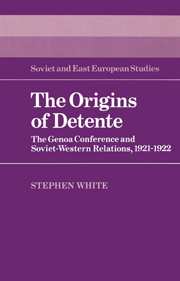Book contents
- Frontmatter
- Contents
- Preface
- List of abbreviations
- Technical note
- 1 Europe and Russia after the war
- 2 Approaching the Russian problem
- 3 From Cannes to Boulogne
- 4 Diplomatic preliminaries
- 5 Soviet Russia and Genoa
- 6 The conference opens
- 7 Rapallo
- 8 Closing stages
- 9 Genoa and after
- Notes
- Select bibliography
- Index
3 - From Cannes to Boulogne
Published online by Cambridge University Press: 04 August 2010
- Frontmatter
- Contents
- Preface
- List of abbreviations
- Technical note
- 1 Europe and Russia after the war
- 2 Approaching the Russian problem
- 3 From Cannes to Boulogne
- 4 Diplomatic preliminaries
- 5 Soviet Russia and Genoa
- 6 The conference opens
- 7 Rapallo
- 8 Closing stages
- 9 Genoa and after
- Notes
- Select bibliography
- Index
Summary
The Cannes Conference began on 4 January 1922 with a series of bilateral meetings among the Allied premiers and their advisers. The first meeting, on 4 January, was between Lloyd George and Briand. Briand, who had left Paris the previous evening, was determined to secure a Franco–British alliance which would improve his domestic standing and indeed contribute to the long-term vision he was already entertaining of a European system of alliances, including Germany and Russia, to preserve a just and stable peace upon the continent. This vision found expression some years later in the Locarno Pact. The public mood in Paris on his departure was reported to be one of ‘uneasiness and depression’; there were doubts about the proposed treatment of Germany and Russia and about French security, and business opinion in particular was sceptical about the scheme for European reconstruction, which was seen as more of a palliative than a cure. Britain, explained Le Temps, located as it was outside the European continent, saw European problems in a simplified form, rather as the distant spectator saw only mountain ranges while the local inhabitants sought with difficulty to make their way through the valleys and the summits. France, like Belgium and Italy, knew her continental neighbours better than Britain did, and knew better the conditions that must be satisfied if peace and prosperity were to be re-established. The basic requirement was that France and Britain should be prepared to resist German agression, whether in the framework of an alliance or otherwise.
- Type
- Chapter
- Information
- The Origins of DetenteThe Genoa Conference and Soviet-Western Relations, 1921–1922, pp. 52 - 72Publisher: Cambridge University PressPrint publication year: 1985

